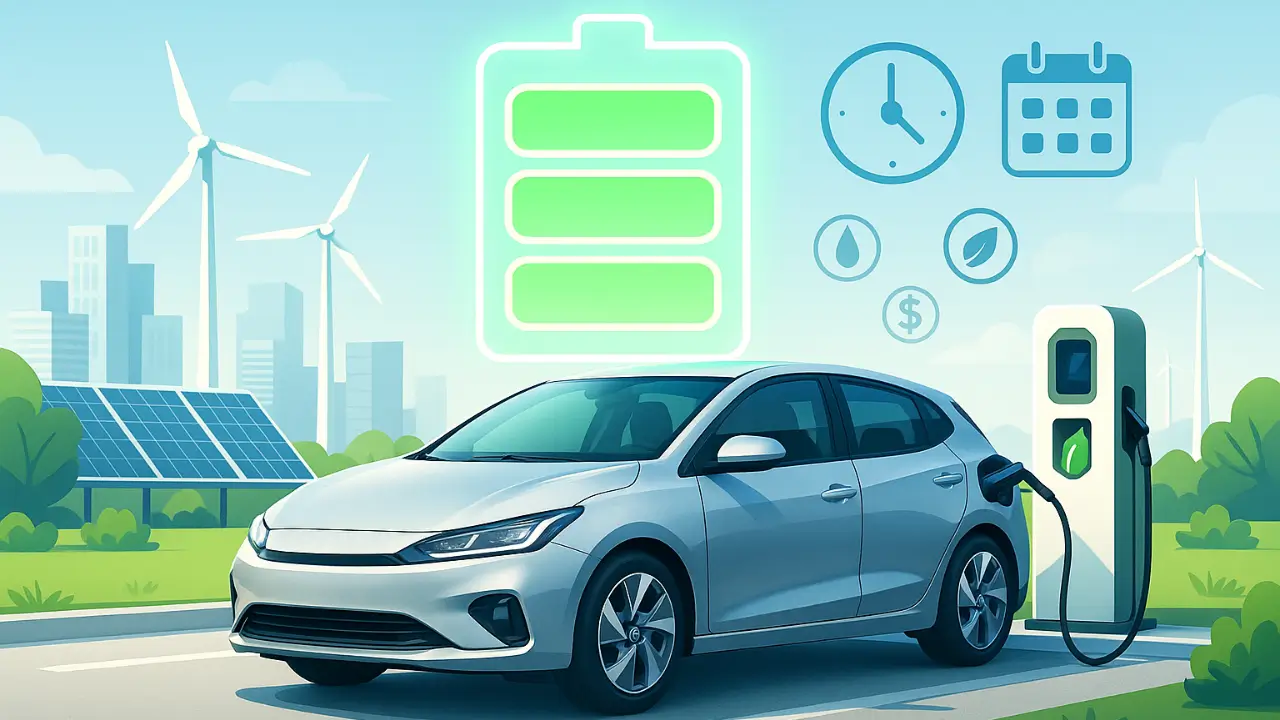Electric car battery life: what you should expect in terms of longevity, charging cycles, maintenance tips, and replacement costs.
Introduction
Whether for environmental reasons the low cost per charge or the acceleration that is possible with an all electric powertrain. Consumers are increasingly drawn to electric vehicles and one of the biggest questions they have is. How long do electric car batteries last? The battery being the most expensive part of an electric vehicle its life has crucial implications not just for the cars cost but also its greenness. This article will explore what a reasonable life expectancy for a battery in such a car is how. Life can be encouraged or discouraged and what some of the options for replacing such a battery are.
What is the lifespan of an EV battery?
The lifespan of an EV battery is generally measured in two ways: by years or by mileage. Modern EV batteries typically have life spans of 8 to 15 years or 100,000 to 300,000 miles respectively. It further depends on the make model and other variables. Battery performance and capacity are typically covered under 8 years or 100,000 miles whichever comes first by most manufacturers warranties.
EV batteries do not just stop working one day they degrade over time. Their capacity to hold a charge diminishes over time so that after many years of use a battery may offer only 200 or fewer miles of range instead of the promised 250. This phenomenon is known as capacity fade.
Why Do Batteries Degrade?
But like the battery in a cellphone or laptop the lithium ion battery in an electric car will degrade over time. Several factors influence the degradation rate:
Heat Exposure
Electrochemical batteries are very sensitive to temperature. Remaining under high temperatures for long periods of time can speed up the chemical reaction inside your power pack wearing it down even faster. That is also why EVs in hotter regions may tend to see a little faster degradation if they are not properly managed.
- Audi GT50 Concept: A Loud Reminder of Why Car Enthusiasts Fell in Love With Audi
- Nearly 30% of UK Drivers Believe Car Tax Should Be Based on Mileage — Survey
- Why Planes and Boats Escaped the Luxury Tax But Cars Didn’t
- Australia’s Headlight Confusion: Authorities Warn Drivers After Viral $250 Headlight Rule Goes Wild Online
- 2025 Hyundai Venue Facelift Launched in India – Full Details, Variants, and Price
Frequent Fast Charging
While DC fast chargers are convenient particularly on long road tripS. They generate more heat and put the battery under more stress. Its okay to fast charge every so often but frequent use can contribute to premature battery wear.
Depth of Discharge
The process of constantly drawing a battery down to almost zero and then back up to 100% inflicts more wear on the cells. While most EVs are designed to prevent such extremes. Those who regularly charge to 100% or let their battery levels to dip to 0% may see their battery degenerate more quickly.
Driving Habits and Load
Heavy load, quick driving, frequent up and down battery consumption becomes larger. This may result in faster wear over time.
What Kind of Breakdown Is Normal?
Battery wear is not always even. Most EV’s experience around 2-3% of capacity loss per year. For instance the nuts and bolts of a car that offers a 300 mile range. It may see around a 15-20 mile reduction in range after five years. But a lot of the EVs still hold 80% of their capacity after 8–10 years which is not too bad for daily driving.
Some carmakers like Tesla, Hyundai and Nissan have been putting out long term data. Their batteries can last well over 150,000 miles before they begin to lose capacity in any serious way.
Can the Battery Be Replaced?
Yes EV batteries can be exchanged, but at a huge expense. A full battery exchange can cost 5,000 to 20,000, depending on the vehicle and size of the battery. Yet as the technology spreads battery costs are slowly falling and the range of EVs is creeping up.
That said for most drivers the battery will not need to be replaced throughout the life of the vehicle. EVs are designed for long battery life at least a decade and most come with pro rated warranties. This provides coverage should a battery degrade beyond a specified level usually less than 70% capacity.
Conclusion
Batteries in electric cars are designed to last. The lifetime of a modern EV battery should exceed a decade and it should deliver reliable service the entire time. And while there is degradation expected over time. It is generally gradual and should not be a deal breaker for most drivers. In line with technological advances and increase in charging availability the life and ease of owning an electric vehicle will further expand.
